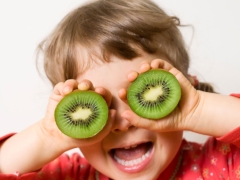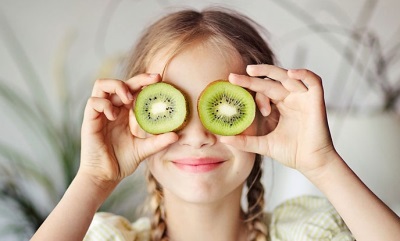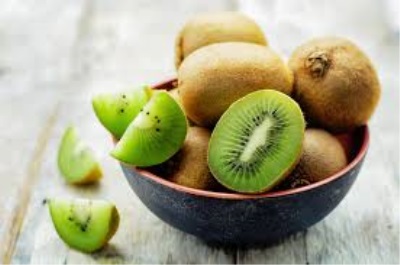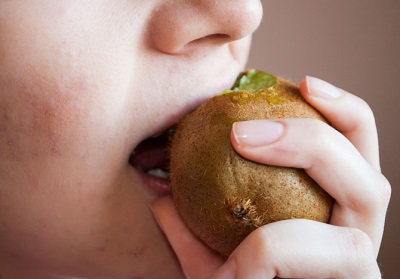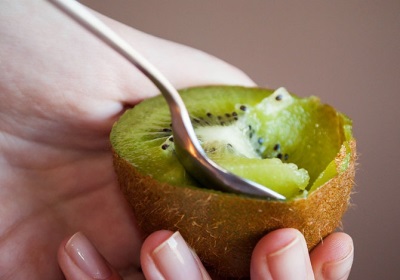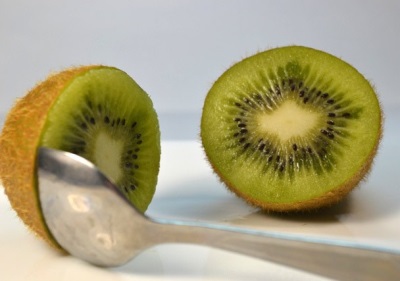From what age can kiwi be given to a child?
Fruits appear in the diet of infants of the first year of life after the introduction of vegetables and cereals in the children's menu. Usually, the first fruit that a crumb younger than a year meets is an apple. After that, parents want to give crumbs and other fruits, knowing their benefits for the growing body. At what age can you give a karapuzu such an exotic fruit as kiwi?
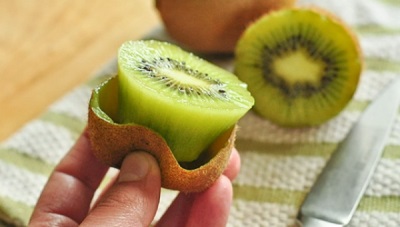
Benefit
Despite its small size, kiwi is a source of valuable vitamins, as well as minerals. Especially a lot in this fruit of vitamin C and potassium. This exotic fruit is rich in B vitamins, beta carotene, fiber, pectins, magnesium, retinol, vitamin D, organic acids and many other beneficial substances. Eating Kiwi regularly can:
- Increase resistance to infections and viruses.
- Improve the work of the heart.
- Eliminate constipation and normalize digestion.
- Strengthen vascular walls.
In addition, kiwi is an excellent prevention of the appearance of kidney stones and cancers. Due to its low sugar content, this fruit can be consumed in diabetes. Such a large number of positive properties makes the kiwi a necessary fruit in the children's diet, if you observe the terms and rules of its introduction.
The harm of an exotic fruit for babies
Since kiwi belongs to fruits that do not grow in our latitudes, it should be tried very carefully in childhood.
First of all, the fetus is at risk for allergies. According to all pediatricians, this fruit is contraindicated in infants younger than six months. Introduce karapuza with such exotic should be much later. But even with the observance of pediatricians allowed terms, Kiwi should not be given to children with digestive tract diseases, hypotension, diarrhea and kidney diseases.
Caution for allergic children
A British study conducted in 2003 showed that kiwi is a great danger for children who are prone to allergies. The risks of a reaction to this exotic fruit are especially high in children under 5 years old.
Of the three hundred people who participated in the study, 80 were children. The condition of two thirds of children after the first test of kiwi deteriorated. Three babies even got to the hospital.
Symptoms of an allergy to kiwi were tongue edema, pharyngeal dermatosis and shortness of breath, and in the most difficult cases, anaphylactic shock. Fortunately, no deaths were recorded. On the basis of this study, allergists advise parents to be more attentive with the introduction of kiwi in the children's diet, treating this fruit as a highly allergenic product.
How many months (years) should I add to my diet?
As we have already noted, babies who are not yet six months old do not give kiwi, like other fruits. At the age of 6 to 12 months, most pediatricians are not advised to give kiwi for a trial. One-year-old children who have not been shown a tendency to allergies, can give kiwi in small quantities. Then you should follow the reaction of the crumbs to the fruit.
But many doctors do not recommend the use of this exotic fruit at the age of 1-3 years.If parents are at risk of introducing kiwi into the menu of babies of this age, then one or two fruit plates or 1-2 teaspoons of kiwi puree no more than 1 time per week are considered acceptable.
From the age of 3, you can acquaint your baby with kiwi without fear. Allowed amount of fruit is considered half of the fruit. Give it either in solid form after cleaning, or crushed in a puree. You can also squeeze out juice from kiwi and mix it with any other juice. At the same time to get involved in exotic fruit, three-year-olds are not worth it. Give kiwi to babies from 3 to 5 years old only once a week.
The children, who are already 5 years old, are allowed by the doctors to eat a whole fruit a day, but still do not recommend eating it more than once or twice a week.
You can make a natural kiwi popsicles. See the recipe in the "Family Cuisine" channel video.
Opinion Komarovsky
The famous pediatrician does not advise giving fruit lure until the moment when the child has at least one tooth. On average, this happens at 8 months of age, but even for such children, Komarovsky does not recommend giving such exotics for our locality, like kiwi, along with mango and avocado. The popular doctor calls the usual apple the best choice for the first fruit feeding.
Tips for choosing a quality fruit
Buying kiwi for babies is best in the store, not in the market. To select a good kiwi a little press on the fruit with two fingers. If you have a ripe fruit in your hands, it will be soft. Too hard fruit is likely to be unripe. But unnecessarily soft kiwis are not worth buying, because this is evidence of over-maturity.
After pressing, evaluate the kiwi in appearance:
- A ripe fruit will have a pleasant smell, similar to citrus.
- To the touch the fruit should be quite dense.
- A sweet ripe kiwi will have an elastic smooth skin. At the same time, the "hairiness" of the fruit is in no way connected with its quality, but depends on the variety.
- The color of the fruit is also determined by the degree of maturity and grade.
- When pressing on the place of the stem juice should not stand out.
You should not buy kiwi, if its skin is dry and wrinkled, there are wet spots, cracks or mold on the surface of the fruit. If you purchased an unripe kiwi, leave it to ripen at room temperature away from the rays of the sun and heat sources.
